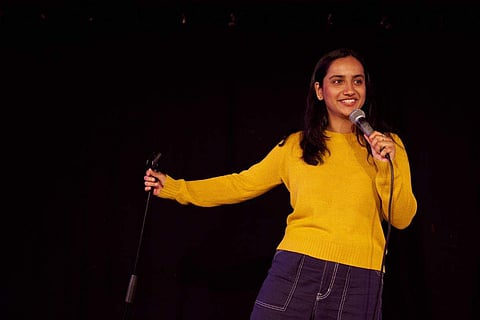
- LIFESTYLE
- FASHION
- FOOD
- ENTERTAINMENT
- EVENTS
- CULTURE
- VIDEOS
- WEB STORIES
- GALLERIES
- GADGETS
- CAR & BIKE
- SOCIETY
- TRAVEL
- NORTH EAST
- INDULGE CONNECT

Urooj Ashfaq recently became the first Indian to win a prestigious Edinburgh Comedy Award for her show Oh No! From watching comedy shows during her college days to finding her way to the stage and making audiences laugh, Urooj has had quite some journey! Having started with a writing job for AIB and then for Son of Abish, she seemed destined to make it big in the stand-up scene. Following her award-winning performance, we get chatty with the Mumbai-based comedian to know more about her show, her favourite topics to work on and lots more...
Congratulations on winning the Best Newcomer award at the Edinburgh Comedy Awards! How does it feel?
I’m thrilled to have won it and I think it’s pretty surreal to win a Perrier (as the awards were formerly known) award, the British call it the ‘Oscars of Comedy’ — something I found out after having won it, so yeah, it feels very significant. I hope it brings more global attention to the comedy scene in India and more acts performed at the fringe, it’s a great experience.
How did the idea of standup comedy start for you? Was it something that came naturally to you?
I’ve always loved everything funny! I used to watch live comedy shows in college and then I learned about open mics where newcomers could get on stage and try out for the first time. After the completion of my bachelor’s degree, I applied to several colleges for a master’s degree and didn’t get into any, so I took a gap year and started doing open mics. I got a writing job with AIB and then Son of Abish and in that year I felt comedy could be an actual career path for me as I loved doing it.
Who were some of the people you looked up to when you began your career?
I like Sarah Silverman, James Acaster and of course Phoebe Waller-Bridge (not stand-up but a comedy hero). What I like about all of them and all the comedians I look up to is not just that they are indisputably hilarious but also that they do their own thing, they stay true to themselves and they do not pander. Above all, I think from what I have gathered from the way they conduct themselves that they love their work a lot more than they love the perks they get from it (fame, awards, money etc.) and I deeply respect that.
Also read: Trevor Noah’s Bengaluru shows cancelled
Nowadays, many people are giving standup comedy a shot. How do you try to be different from others?
I think being yourself and doing what you think is funny is enough, a lot of the other skills come with time (a lot of which I’m still to learn). We’re all inherently unique, so, I think being true to yourself ensures you’re different enough.
Earlier, standup comedy was a maledominated industry. But now, women are making a successful career in it too. What do you think could be the reason for it?
One of the primary reasons for women making a successful career in stand-up comedy could be that women are funny. I can only conclude on account of having a great sense of humour and talent that women are doing well but I could be wrong. I’m only a woman.
Tell us about the idea behind your awardwinning show?
This is the first time I’ve ever written a full-length show, so, I tried to write about everything that I find funny, my life experiences etc. I put all of my jokes about therapy, childhood experiences, relationships etc. together and read my childhood diary at the end! I just tried my best to write a funny show. The rest came together as I performed it every day.
A lot of stand-up is based on life experiences. How easy or difficult is it to put one’s life out there on the stage?
Of course, it depends on individual comfort level, but, I think a good rule of thumb is to probably start talking about something on stage after you have processed your feelings off stage. In that case, you are making jokes on something retrospectively and you may not feel as pained or as vulnerable on stage or from any reactions you could receive online or at the show.
When you are not working on any piece or performing, what does your daily life look like?
The only time I have a routine is when I do stand-up comedy, so, I get on stage almost every day, sometimes for an hour, sometimes for 10 minutes depending on which show I have that day. But if I’m not writing or performing on a particular day, I just waste my time watching television, reading, chatting with my loved ones or cuddling with my cat.
Also read: A date night with the ladies of comedy
Email: alwin@newindianexpress.com
X: @al_ben_so